Advantages and Disadvantages of Artificial Intelligence in 2024
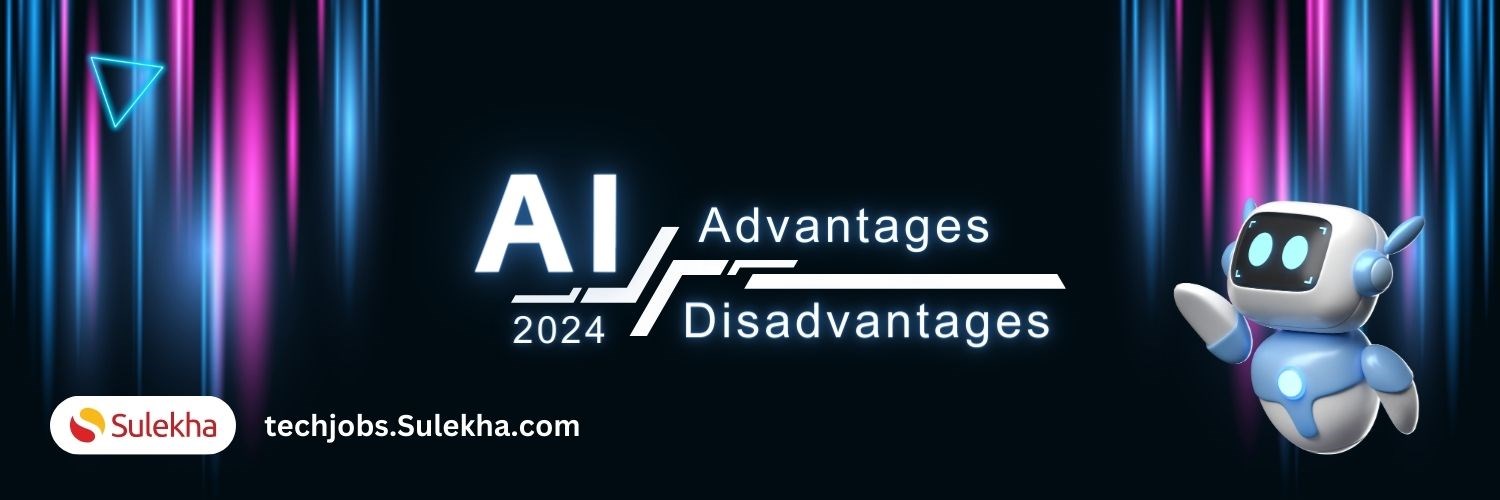
Advantages and Disadvantages of Artificial Intelligence
Artificial Intelligence (AI) is a transformative technology that offers numerous benefits, such as enhanced efficiency, 24/7 availability, rapid data processing, and fostering innovation across various industries. However, understanding the advantages and disadvantages of AI is crucial, as it also presents challenges like potential job displacement, high costs, lack of creativity, and security and privacy risks. Addressing the ethical considerations of AI, such as ensuring fairness, transparency, and accountability, is essential for its responsible development and deployment. Numerous use cases for AI exist, including healthcare diagnostics, fraud detection in finance, personalized recommendations in retail, and autonomous operations in transportation. To effectively leverage AI, it's important to choose the right program that aligns with specific needs, considering factors like task complexity, budget, scalability, and required expertise.
What is Artificial Intelligence (AI)
Artificial intelligence (AI) is a machine that mimics human intelligence. It's a field of computer science focused on creating machines that can handle tasks that usually require human thinking, like understanding language, recognizing patterns, and even learning. AI is already widespread; from the recommendations you get online to spam filters in your inbox. While super-intelligent AI is still science fiction, the technology is already changing our world in many positive ways.
What is the demand of Artificial Intelligence (AI)
Artificial Intelligence (AI) has advantages and disadvantages when its proliferating demand increases among us. The advantage is that AI encompasses a broad range of technologies and applications and reduces human effort. On the other hand, AI and robotics have led to substantial concern about large-scale job losses. According to Statista, the market size in the Artificial Intelligence market is projected to reach US$305.90bn in 2024. The market size is expected to show an annual growth rate (CAGR 2024-2030) of 15.83%, resulting in a market volume of US$738.80bn by 2030.
Why AI a demanding career path?
AI is a demanding career path due to the rapid pace of technological advancement, the need for continuous learning, and the high expectations for delivering innovative solutions.
1. The field offers many job opportunities with competitive salaries, attracting professionals seeking rewarding and well-compensated work.
2. AI's broad applications across diverse industries allow professionals to work on cutting-edge technologies that significantly impact society. Rapid advancements in deep learning, reinforcement learning, and explainable AI continually push the boundaries of what is achievable in AI, necessitating continuous learning and exploration.
3. AI's ability to enhance productivity by automating repetitive tasks allows individuals to focus on more complex challenges, leading to more innovative work practices.
4. The field of AI offers extensive career growth opportunities as it reshapes industries and job roles, making professionals skilled in AI-related fields highly sought after.
5. AI jobs are considered future-proof due to the increasing demand for AI professionals as more companies integrate AI technologies into their operations and services.
Use Cases for AI
AI technology is a substantial tool for human beings. AI (Artificial Intelligence) aims to create intelligent machines that can perform tasks that typically require human intelligence, such as visual perception, speech recognition, decision-making, and language translation. AI aims to replicate human cognitive abilities in machines to automate tasks, improve efficiency, and solve complex problems. Artificial intelligence can be utilized in healthcare, education, electronics, software development, pharmacies, games, engineering, communication, and development. AI is based on science and technology in disciplines like information technology, biology, psychology, mathematics, etc. The main advantage of artificial intelligence is that the work will be accurate, and the time can be saved.
Aim of Artificial Intelligence (AI):
The goals of AI encompass simulating human-like intelligence in machines to enable autonomous problem-solving, decision-making, natural language processing, machine learning, robotics, healthcare advancements, and fostering creativity and innovation.
1. Problem-Solving and Decision-Making: AI aims to develop systems that can efficiently solve complex problems and make informed decisions.
2. Natural Language Processing (NLP): The goal is to enable machines to understand, interpret, and generate human language for improved communication and interaction.
3. Machine Learning and Deep Learning: AI seeks to create algorithms that can learn from data, recognize patterns, and make predictions without explicit programming.
4. Robotics and Automation: The objective is to design intelligent machines capable of performing tasks autonomously in various industries to enhance efficiency and productivity.
5. Enhancing Healthcare and Medicine: AI strives to revolutionize healthcare by improving diagnostics, treatment planning, personalized medicine, and overall patient care.
6. Fostering Creativity and Innovation: The aim is to leverage AI to inspire new ideas, facilitate creative processes, and drive innovation across different domains.
Advantages and disadvantages of Artificial Intelligence (AI)
Advantages of Artificial Intelligence
AI automates repetitive tasks, freeing humans for more complex work and increasing productivity.
AI analyzes vast data sets to uncover hidden patterns, enabling better-informed decisions across various fields.
AI systems work tirelessly, providing constant service in areas like security monitoring or customer support.
AI helps safeguard us through security cameras, suspicious activity detection, and even cyberattack prediction.
AI helps humans by offering 24/7 availability for learning and education through various tools, promoting learning anytime and anywhere, eliminating issues like time constraints and lack of resources, and providing proper guidance and support.
AI analyzes complex scientific data, accelerating discoveries in astronomy and medicine.
Now, we shall discuss how these advantages of AI enhances efficiency, safety, and productivity across various industries by leveraging its capabilities to reduce errors, manage risks, and provide continuous service without human limitations. Advantage of Artificial intelligene across various industries includes:
Transportation
Robots
Health
Education
Commination
Public safety and security
Entertainment
Employment
Now, we shall discuss each of them in detail with examples.
Smarter cars
Implementing AI in smarter cars involves advanced driver-assistance systems (ADAS) that utilize sensors, cameras, and AI algorithms to enhance safety and assist drivers in critical situations. AI enables features like lane-keeping assist, automatic emergency braking, and blind-spot detection, improving the overall driver experience and making vehicles more autonomous and efficient. Additionally, AI in cars enhances safety through collision avoidance systems, driver fatigue monitoring, and personalized driving preferences, revolutionizing the automotive industry with intelligent technologies.
For example,
Tesla is a prominent example of a car brand that implements Artificial Intelligence (AI) in its vehicles, particularly through its Autopilot system.
AI in social media
AI in social media involves leveraging artificial intelligence technologies to enhance user experiences, streamline marketing operations, and enable data-driven decision-making on social networking platforms. AI algorithms analyze user behavior, preferences, and interactions to deliver personalized content, automate advertising campaigns, and optimize social media strategies. These algorithms ultimately transform the dynamics of online interactions and improve engagement for users and businesses. Some key uses of AI in social media include:
1. Personalization
2. Chatbots
3. Content Generation
4. Sentiment Analysis
5. Optimization of Paid Media
6. Social Listening
For example,
Facebook, Twitter, LinkedIn, Pinterest, Snapchat, etc, utilize Artificial Intelligence (AI)
AI in Robotics
Artificial Intelligence (AI) plays a crucial role in robotics by enabling robots to perceive, reason, and act in complex environments. AI algorithms help robots make decisions, learn from data, and interact with the world autonomously. Some typical applications of AI in robotics include computer vision for object recognition, path planning for navigation, and machine learning for improving performance over time. Overall, AI enhances the capabilities of robots and allows them to perform tasks that would be challenging or impossible for humans.
For example,
Automated welding robots use AI vision to track seams and adjust welds in real time.
AI in e-commerce
Artificial Intelligence (AI) in e-commerce is revolutionizing the online shopping experience by enhancing customer interactions, streamlining operations, and driving business success. AI tools in e-commerce include personalized product recommendations, chatbots for customer service, dynamic pricing tools, smart logistics systems, sales and demand forecasting, voice and visual search capabilities, fraud detection, and more.
For example,
Have you ever browsed Amazon and seen a section titled "Customers Who Bought This Item Also Bought"? That's the work of AI in action.
AI in Education
What are the advantages and disadvantages of AI in education? Artificial Intelligence (AI) is reshaping education by offering innovative solutions to enhance learning experiences. Educators can provide tailored support to students, improve academic outcomes, and streamline administrative tasks through AI-powered tools such as personalized learning platforms, intelligent tutoring systems, and automated grading systems. AI also enables the creation of virtual classrooms and immersive learning experiences, making education more engaging and accessible. By leveraging predictive analytics, AI can help identify student needs and learning trends, allowing educators to intervene proactively and provide targeted interventions.
However, the disadvantages include the risk of errors and bias, dependence on technology, privacy concerns, lack of human interaction, and the potential for cheating.
For example,
One example of AI in education is using adaptive learning platforms like DreamBox Learning. DreamBox uses AI algorithms to analyze students' learning behaviors and performance data to provide personalized math lessons tailored to each student's strengths and weaknesses.
AI in Safety and Security
AI in safety and security utilizes machine learning algorithms to analyze vast amounts of data for threat detection, risk assessment, and anomaly detection. It enables predictive maintenance, surveillance monitoring, and real-time response to potential hazards in critical infrastructure and public spaces. AI-powered facial recognition, behavior analysis, and object detection systems enhance security measures in airports, smart cities, and border control. Additionally, AI-driven cybersecurity solutions identify and mitigate cyber threats, including malware, phishing attacks, and data breaches, to safeguard digital assets and sensitive information.
Disadvantages of Artificial Intelligence
Some common and general disadvantages of AI include:
1. High Cost: Developing AI systems can be costly due to the need for specialized hardware, software, and expertise.
2. Lack of Creativity: AI systems lack creativity and may struggle with tasks requiring thinking outside the box or devising novel solutions.
3. Bias and Fairness Issues: AI systems can inherit biases from their training data, leading to unfair or discriminatory outcomes, especially in hiring or lending decisions.
4. Job Displacement: AI and automation can lead to job losses in specific industries as tasks are automated, potentially leading to unemployment and economic disruption.
5. Privacy Concerns: AI systems often require access to large amounts of data, raising concerns about privacy and data security.
6. Ethical Concerns: There are ethical dilemmas surrounding the use of AI, such as the potential for misuse, lack of accountability, and the implications for society.
7. Overreliance on Technology: Relying too heavily on AI systems can lead to the loss of critical thinking skills and human judgment, potentially reducing our ability to make independent decisions.
Disadvantages of AI in Daily Life
Job Displacement: One of the most significant disadvantages of AI is the potential for job displacement. As AI systems become more capable of performing tasks traditionally done by humans, there is a risk of unemployment in sectors such as manufacturing, customer service, and even white-collar jobs. This shift can lead to economic instability and require significant efforts in retraining and upskilling the workforce.
Privacy Concerns: AI systems often require large amounts of data to function effectively. The collection, storage, and analysis of this data raise significant privacy concerns, as sensitive personal information could be misused or inadequately protected. This can lead to breaches of confidentiality, identity theft, and other forms of data misuse, highlighting the need for robust data protection measures.
In conclusion, while artificial intelligence (AI) offers numerous advantages, such as increased efficiency, enhanced decision-making, and personalized experiences, it also presents significant challenges and risks. Concerns regarding unemployment, bias and discrimination, privacy infringement, ethical dilemmas, reliability issues, algorithmic transparency, social isolation, and unequal access underscore the importance of responsible AI development and deployment.
As we navigate the AI landscape in 2024 and beyond, it is imperative to prioritize ethical considerations, regulatory frameworks, and inclusive policies to harness the transformative potential of AI while mitigating its drawbacks. By addressing these complexities carefully and collaboratively, we can strive toward a future where AI contributes to human flourishing, innovation, and societal well-being.
Find a course provider to learn Artificial Intelligence Engineer
Java training | J2EE training | J2EE Jboss training | Apache JMeter trainingTake the next step towards your professional goals in Artificial Intelligence Engineer
Don't hesitate to talk with our course advisor right now
Receive a call
Contact NowMake a call
+1-732-338-7323Enroll for the next batch
Artificial Intelligence Engineer
- Oct 20 2025
- Online
Artificial Intelligence Engineer
- Oct 21 2025
- Online
Artificial Intelligence Engineer
- Oct 22 2025
- Online
Artificial Intelligence Engineer
- Oct 23 2025
- Online
Artificial Intelligence Engineer
- Oct 24 2025
- Online
Related blogs on Artificial Intelligence Engineer to learn more
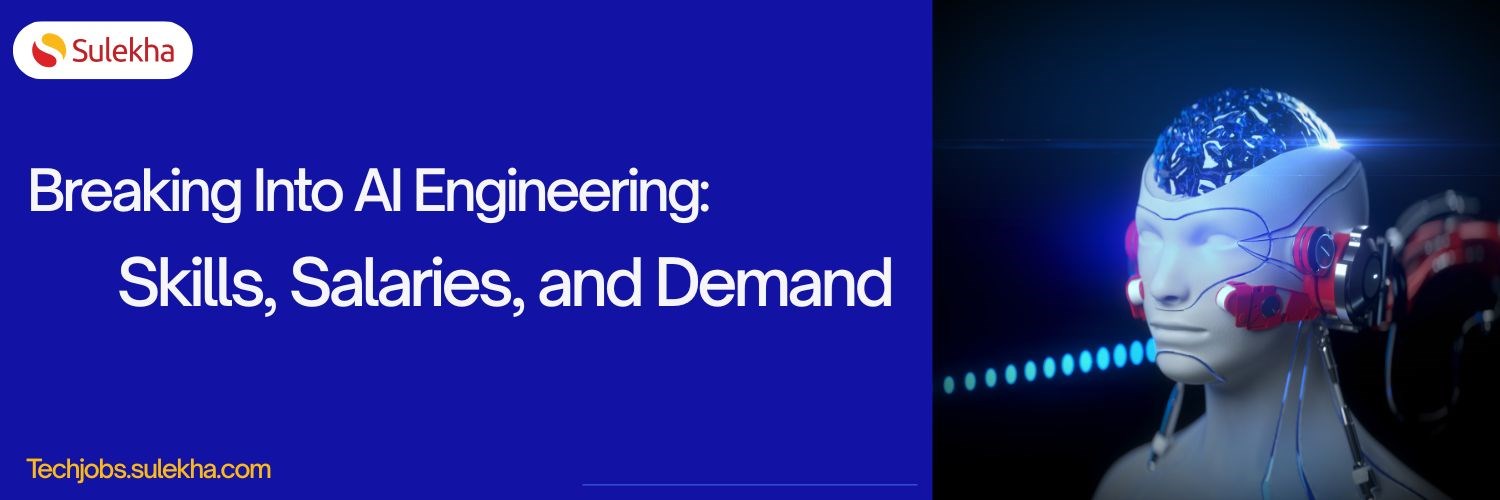
Breaking Into AI Engineering: Skills, Salaries, and Demand in the US
Discover how to break into AI engineering with insights on essential skills, salary expectations, and rising demand in the US. Learn about career paths, certifications, and how to succeed in one of tech’s fastest-growing fields.
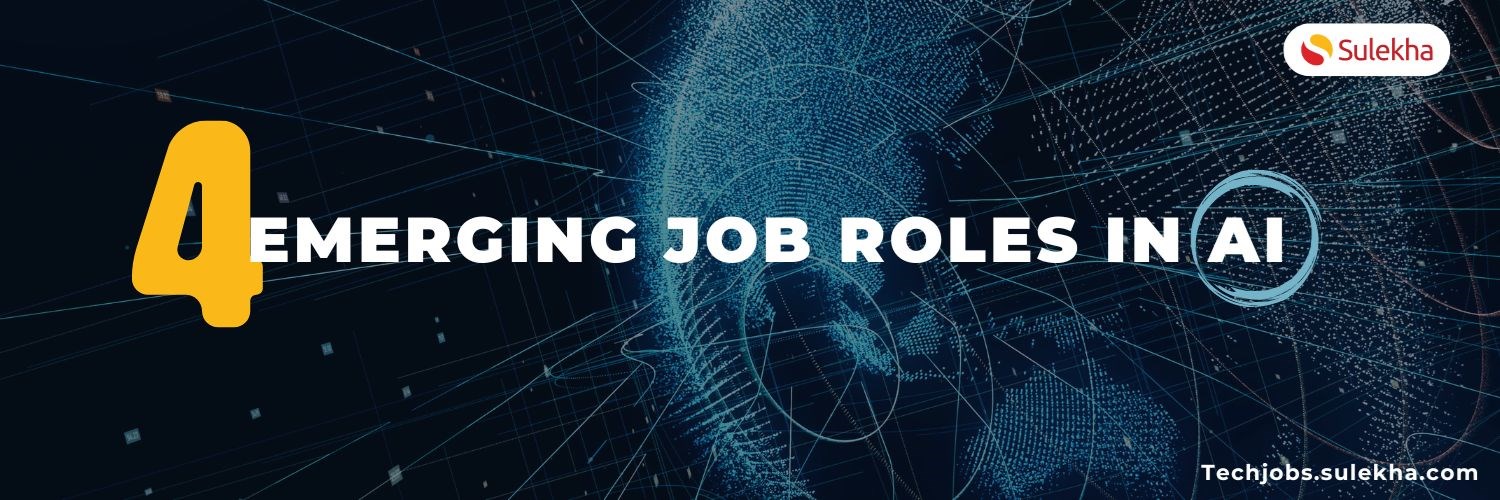
Top Four emerging job roles in AI
Explore four emerging AI job roles including AI ethicist, trainer, interaction designer, and safety engineer, each shaping the future of ethical and secure AI technology. Learn about their responsibilities and the essential skills required in this ev

Prompt Engineering
We have discussed comprehensive entitles of what is prompt engineering, types of prompts, element and method of prompt engineering, and application of prompt engineering in-detail.
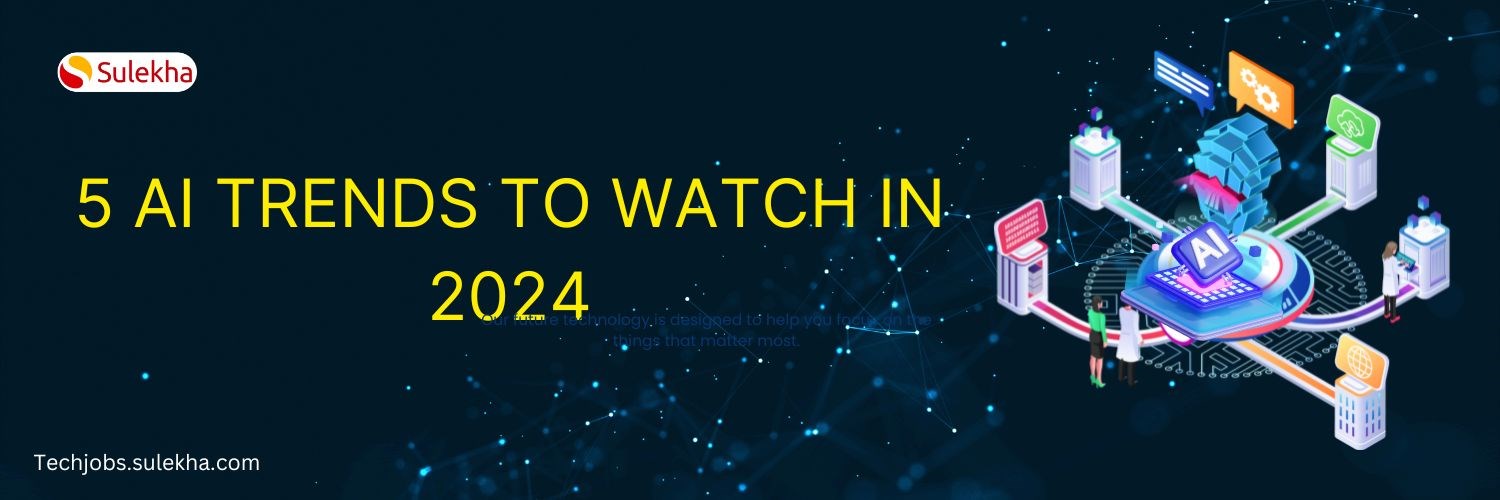
5 AI Trends to Watch in 2024
Discover the top 5 AI trends that will shape the future in 2024, from advancements in natural language processing to the growing impact of AI on healthcare and beyond.
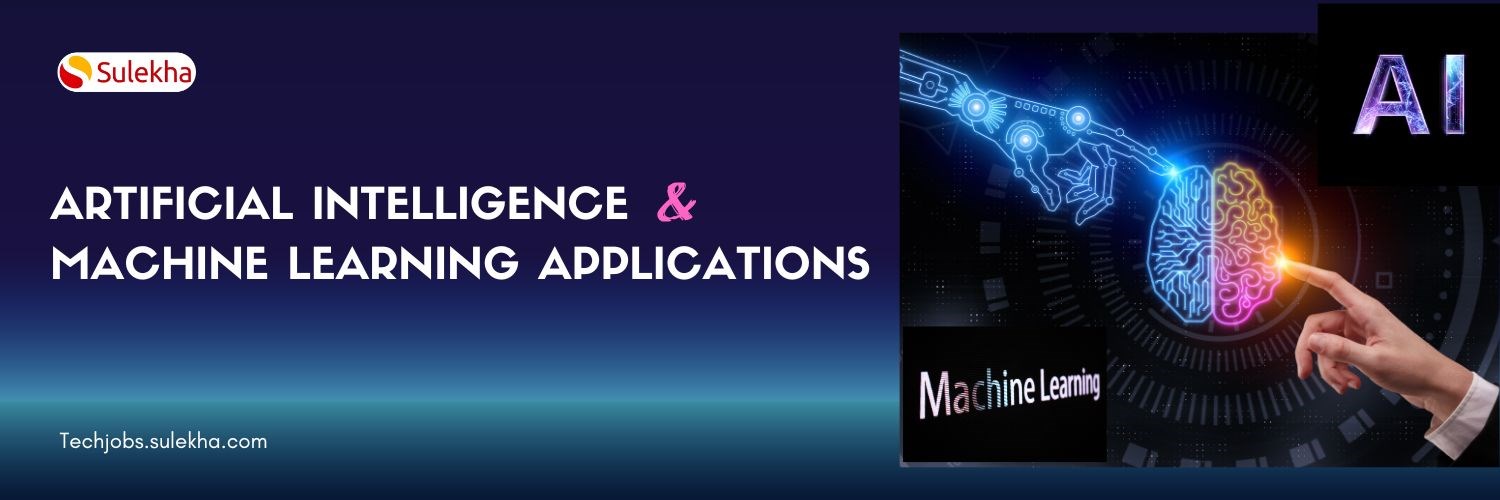
Artificial Intelligence and Machine Learning applications
Discover the vast applications of Artificial Intelligence (AI) and Machine Learning (ML) across various industries, from healthcare to finance, and learn how these technologies are transforming the way we live and work.
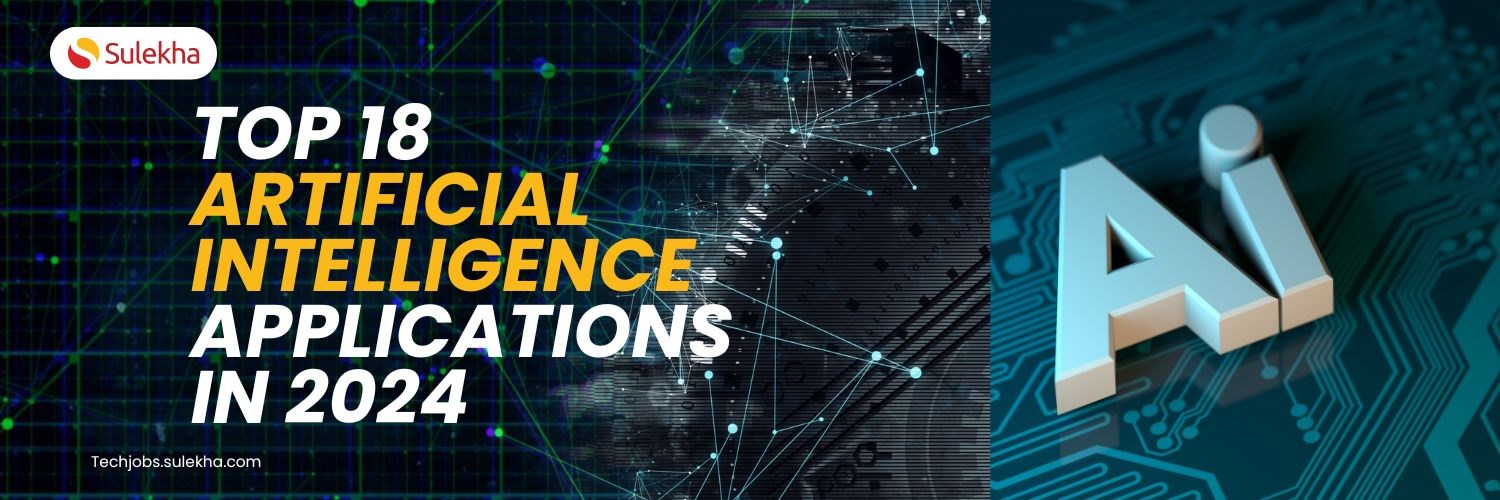
Top 18 Artificial Intelligence Applications in 2024
Explore the diverse applications of machine learning in various industries, including healthcare, finance, retail, and transportation.

What is Generative AI? Everything You Need to Know
Generative AI is not just a career path; it's a gateway to a future where innovation and creativity intersect. This blog uncovers why generative AI is not just a career but a pathway to shaping the future of work.

Devin AI - Friend or Foe of Software Developers
In a groundbreaking leap for artificial intelligence, US-based startup Cognition has unveiled Devin AI - an autonomous AI system capable of conceptualizing, designing, and coding software from scratch. This remarkable feat ushers in a new era, blurri
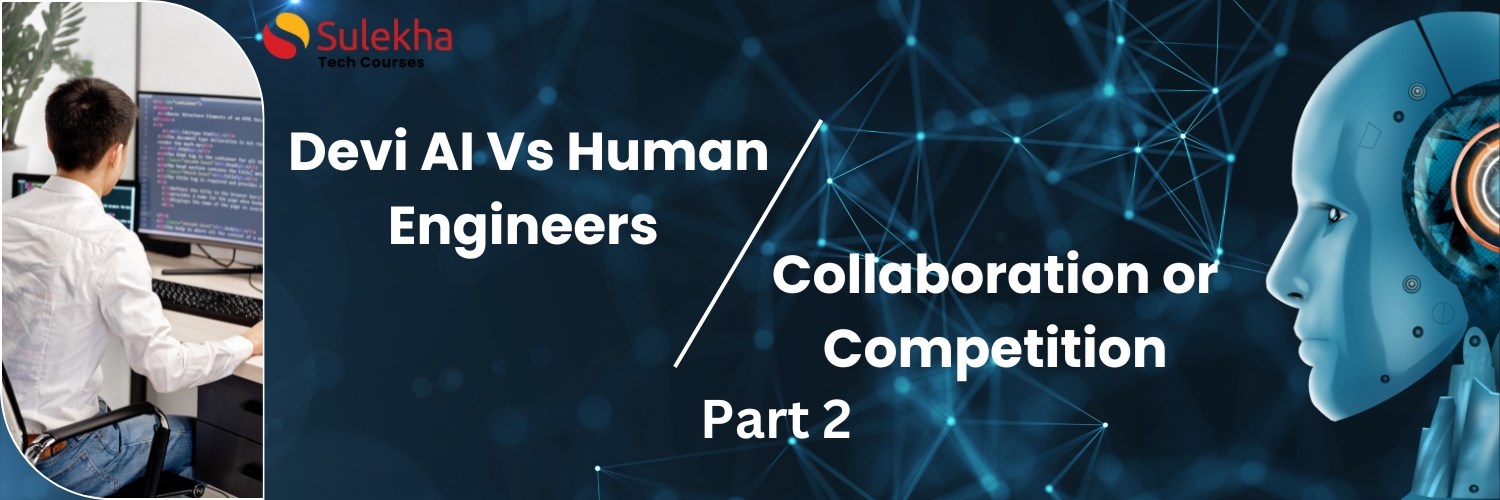
Devin AI vs. Human Engineers: Collaboration or Competition?
In the ever-evolving landscape of software development, a new contender has emerged—a digital prodigy named Devin AI. But is it here to collaborate harmoniously with human engineers, or does it pose a threat to their livelihoods? Let's dive into this

The Fastest-Growing Job Skills of 2024
Discover the top demanding career paths of 2024, complete with statistical insights, essential skill sets, and the latest certifications in RPA, Blockchain, Artificial Intelligence, Cybersecurity and Digital Marketing.
Latest blogs on technology to explore
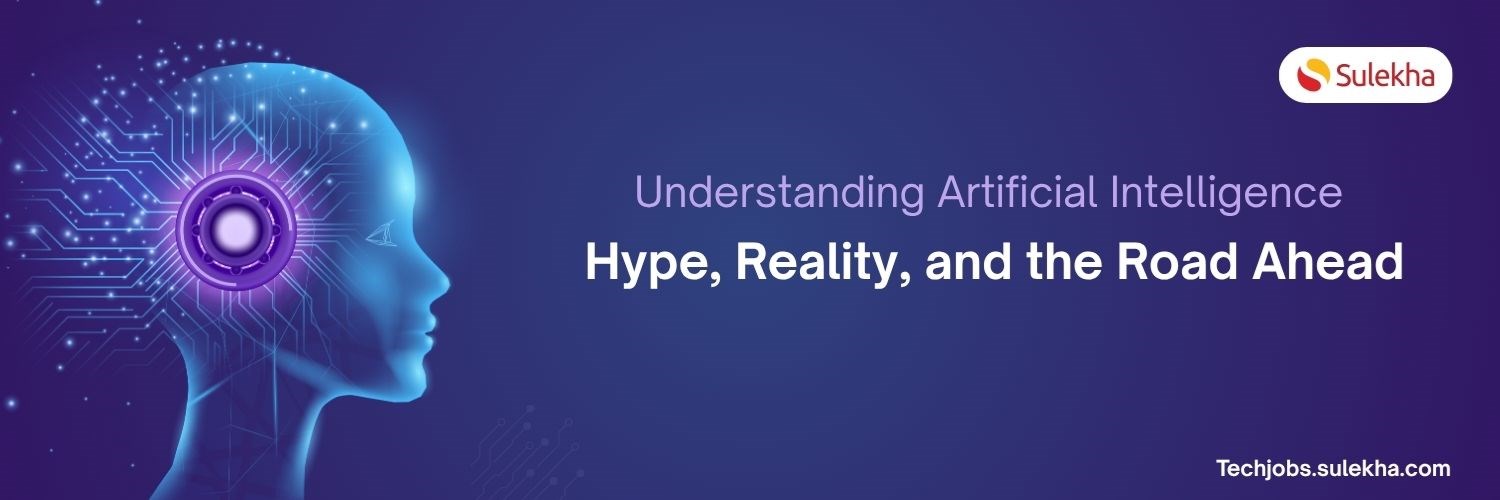
Understanding Artificial Intelligence: Hype, Reality, and the Road Ahead
Explore the reality of Artificial Intelligence (AI) — its impact, how it works, and its potential risks. Understand AI's benefits, challenges, and how to navigate its role in shaping industries and everyday life with expert training programs

How Much Do Healthcare Administrators Make?
Discover how much healthcare administrators make, the importance of healthcare, career opportunities, and potential job roles. Learn about salary ranges, career growth, and training programs with Sulekha to kickstart your healthcare administration jo

How to Gain the High-Income Skills Employers Are Looking For?
Discover top high-income skills like software development, data analysis, AI, and project management that employers seek. Learn key skills and growth opportunities to boost your career.

What Companies Expect from Product Managers in 2025: Skills, Tools, and Trends
Explore what companies expect from Product Managers in 2025, including essential skills, tools, certifications, and salary trends. Learn how to stay ahead in a rapidly evolving, tech-driven product management landscape.

Breaking Into AI Engineering: Skills, Salaries, and Demand in the US
Discover how to break into AI engineering with insights on essential skills, salary expectations, and rising demand in the US. Learn about career paths, certifications, and how to succeed in one of tech’s fastest-growing fields.

Cybersecurity Training: Powering Digital Defense
Explore top cybersecurity training programs in the USA to meet rising demand in digital defense. Learn about certifications, salaries, and career opportunities in this high-growth field.

Why Pursue Data Science Training?
Empower your career in a data-driven world. Learn why data science training is crucial for high-demand jobs, informed decisions, and staying ahead with essential skills.

What Does a Cybersecurity Analyst Do? 2025
Discover the vital role of a Cybersecurity Analyst in 2025, protecting organizations from evolving cyber threats through monitoring, threat assessment, and incident response. Learn about career paths, key skills, certifications, and why now is the be

Artificial intelligence in healthcare: Medical and Diagnosis field
Artificial intelligence in healthcare: Medical and Diagnosis field

iOS 18.5 Is Here: 7 Reasons You Should Update Right Now
In this blog, we shall discuss Apple releases iOS 18.5 with new features and bug fixes